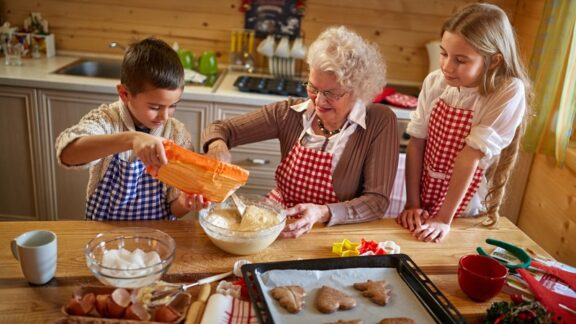It’s only natural to gravitate toward people your own age when you choose life partners, friends or even the people you live among. What on earth would you have in common with “kids” who are decades younger? However, it’s precisely because people of all ages are so different that multigenerational friendships can be so intriguing, rewarding, and even beneficial to both old and young alike.
In fact, the late cultural anthropologist, Margaret Mead, once said, “Connections between generations are essential for the mental health and stability of a nation.” And it seems some governments and organizations agree. San Diego County, for example, has offered seniors below-market rent to live with and mentor foster teens at San Pasqual Academy. And in Boston, the International Homeshare Pilot matches grad students looking for affordable housing with seniors who are eager for companionship.
Exchanging Knowledge
One of the most obvious benefits of multigenerational friendships is the exchange of knowledge. Thanks to your many years in the game, you can be a trusted advisor about jobs, marriage, children – you name it – to those who are just getting started. Conversely, you’ll pick up insights on technology, social media, the environment, and pop culture when you spend time with younger folks.
Broadening Perspective
The most rewarding generation gap relationships blossom when both parties are curious and open-minded. While you both may have firm opinions on certain topics, you and your younger friends should be willing to open your ears – and minds – to the other’s views. Aaron, who is in his 20s, was drawn to his 60-something friend Christine exactly for that reason. While the two didn’t agree on everything, he knew that Christine was always eager to hear what he had to say, while Aaron was also interested in her take on things. Allowing room for the other person’s point of view may bolster your own opinions or could end up even changing them!
Going Deep
When you befriend only peers, you’re likely to end up talking about superficial topics like restaurants, a favorite doctor, or your aches and pains. Striking up a friendship with someone who doesn’t share your same interests or concerns can make you push beyond the trivialities of everyday life into more meaningful conversations. When Linda’s 24-year-old grandson visits, they spend hours chatting over the breakfast bar about everything from eating vegan to family relationships to the things that give life purpose. Linda always comes away from those kitchen convos with lots of food for thought.
Five Ways to Make Friends in Older Age
Multigenerational Friendships Can Keep You Young!
You probably have no problem telling friends your own age when you don’t feel up to exercise or a night out. However, it’s harder to admit that to a younger friend who is always on the go. Plus, a young, active friend, by their example and prompting, will motivate you to get off the couch and join in the fun!
Shattering Stereotypes
I have to admit that after working with a few millennials, I had bought into the stereotype that this generation were all entitled and self-centered. They talked back to the boss, whined about overtime and slow promotions, and showed no deference to those of us with experience. However, after taking the time to really get to know one millennial, my kind, giving, unselfish nephew, I’ve learned that you can’t pigeonhole an entire generation. Maybe I couldn’t be best friends with some of his peers, but there quite possibly could be many others who are worth my time.
Friends add such value to life. When it comes to multigenerational friendships, there should be absolutely no age requirements on who qualifies for that role!





